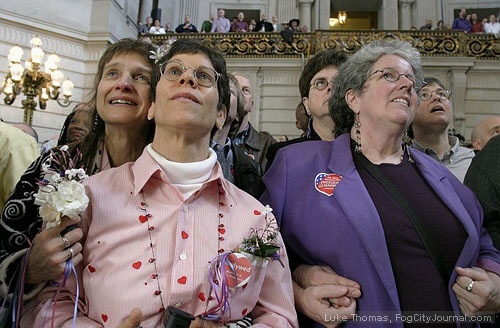
Same sex couples seeking marriage equality and equal treatment under the law
will present several cases before the California Supreme Court tomorrow.
Photo by Luke Thomas
By Julia Cheever
March 3, 2008
Several same-sex couples whose bid to marry goes before the California Supreme Court in San Francisco on Tuesday said today that the four-year-old case has been an emotional roller coaster, but said they also see it as a long-term “human rights struggle.”
Jeanne Rizzo, 61, of Tiburon, said she and her partner were joyfully waiting in line for a marriage license in San Francisco City Hall on March 11, 2004, when clerks abruptly stopped issuing licenses.
The license denial, ordered by the state Supreme Court, “was a devastating moment,” Rizzo said at a news conference presented by the National Center for Lesbian Rights in San Francisco.
“The moment of feeling we were going to miss this was very dramatic,” Rizoo said.
The next year, same-sex couples felt validated when a Superior Court judge ruled that the state constitution gives gay and lesbian couples a right to marry, Rizzo and her partner, Pali Cooper, said.
But in 2006, the pendulum swung the other way when a state appeals court reversed that ruling by a 2-1 vote.
The dispute was then appealed to the state high court, which will hold a three-hour hearing on Tuesday.
Another plaintiff, Jewelle Gomez, 59, of San Francisco, said she marched and demonstrated in the civil rights movement in the 1960s and said the current case “for me is part of the human rights struggle.”
Gomez said, “I’m holding onto the hope that the state Supreme Court reads the constitution the way I read the constitution. It’s meant for everyone.”
Gomez said, “We are asking that the rights on which the United States was founded – life, liberty and pursuit of happiness – be extended to us.”
The court will hear arguments from four groups supporting same-sex marriage and four in opposition.
The supporters include the city of San Francisco and three groups of a total of 19 same-sex couples.
Opponents include state Attorney General Jerry Brown and Gov. Arnold Schwarzenegger, who say that heterosexual marriage is deeply rooted in tradition and domestic partnerships provide nearly the same rights.
Two other traditional-values groups have gone a step further in arguments before the court and have contended that marriages between a man and a woman are better for children.
The court’s seven justices will have three months after Tuesday’s hearing to issue a written ruling.
Eleven of the same-sex couples are represented by the San Francisco-based National Center for Lesbian Rights.
Center executive director Kate Kendell predicted the high court judges will focus on whether the state’s domestic partnership system provides adequate rights and protections for gay and lesbian couples.
“Our argument is that it is not enough,” Kendell said.
Kendell said, “Domestic partnerships don’t have the dignity and transcendental notion of marriage. No father ever said he couldn’t wait to dance at his daughter’s domestic partnership ceremony.”
Kendell estimated that there are 92,000 same-sex couples in the state and that more than 70,500 children live in such families.
Glen Lavy, a lawyer who will argue against same-sex marriage on Tuesday, charged today that “certain special interest groups are trying to bypass the democratic process by asking the court to redefine marriage.”
Lavy, an attorney with the Arizona-based Alliance Defense Fund, represents the Proposition 22 Legal Defense and Education Fund in the case.
Proposition 22, passed by state voters in 2000, requires marriage to be between a man and a woman.
Lavy said, “The government should promote and encourage strong families. In this case, marriage laws that will do that are under attack by political special interests wishing to further their agenda.”
The case began four years ago when the city of San Francisco began issuing same-sex marriage licenses in February 2004 on the instructions of Mayor Gavin Newsom.
After about four weeks and 4,000 licenses, the state Supreme Court halted the practice, ruling in a lawsuit filed by then-Attorney General Bill Lockyer.
The court later ruled that the city had no authority to issue the licenses, but said it was willing to allow separate proceedings to test the constitutionality of state marriage laws.
Eventually, six lawsuits were filed, four by the city of San Francisco and the three sets of same-sex couples and two by the Proposition 22 fund and the Campaign for California Families.
Brown and Schwarzenegger joined the cases to defend the state laws, which include Proposition 22 and a 1977 measure passed by the Legislature.
The cases were consolidated in San Francisco Superior Court and over the next four years made their way to the state high court, which will have the final word on whether the laws violate the California constitution.
In another aspect of the dispute, same-sex marriage opponents are circulating ballot initiatives that would make the opposite-sex marriage requirement part of the state constitution.
Geoff Kors, executive director of Equality California, a gay rights group, said at the news conference, “We’re confident that if it does get on the ballot we will win, but we don’t want to see it on the ballot.”
Equality California and another group, Our Family Coalition, are plaintiffs along with the 11 couples in the National Center for Lesbian Rights lawsuit.


 The Hunger Site
The Hunger Site
No Comments
Comments for Same sex couples see marriage case
as human rights struggle are now closed.